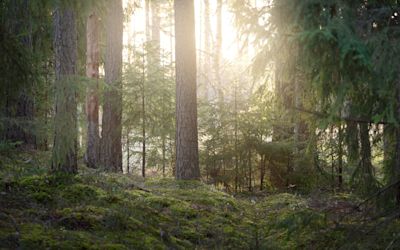The Voluntary Carbon Market Is Here to Stay – Now Let’s Make It Work for Rural America

A road winds through a snowy forest
If there’s one thing to take away from COP28, it’s that nature is undoubtedly an indispensable element to avoiding climate catastrophe. Natural climate solutions, alongside reducing emissions and technological advances, must be maximized to keep our planet from warming more than 1.5 degrees Celsius by 2030. Currently, the most financially viable option to maximize nature’s climate potential is through carbon markets. World leaders like U.S. Special Presidential Envoy for Climate John Kerry, EU President Ursula von der Leyen, and UN Executive Secretary Simon Stiell at this year’s COP made it clear that if we are to achieve our ambitious global climate goals, we must leverage carbon markets, especially the global voluntary carbon market. The reality is that this financial mechanism to scale natural climate solutions, however controversial, is here to stay.
But with that reality comes questions of the feasibility of building a market that makes a real climate difference and works for the communities that need the most support. To date, one of the key barriers for standing up this market is a lack of adequate investment. Private investors want to be in this market and are eager for this kind of sustainable investment, but because the market is so new and the rules are still being set, we’re still seeing private investors sitting on the sidelines. One area of alignment among COP participants and presenters was that government can work alongside private capital to scale the market, just like government has done this for other commodity markets.
Creating the enabling conditions for a viable voluntary carbon market in the United States would answer calls for boosting rural economies, protecting the health of our forests, and doing our country’s part in climate action. The good news is that we’ve seen the U.S. government provide this type of investment in other industries, like with the renewable energy industry, which at its start needed substantial government funding to kickstart widescale adoption and deployment. Subsidies and incentives including federal tax credits, grants, and loan programs have contributed to the continued growth of the industry.
What’s more is that our government has invested in other countries’ carbon markets. USAID works with developing countries to mobilize “private investment in sustainable landscapes programs, including performance-based ‘payment for ecosystem services’ programs,” including those that leverage carbon markets. This critical work shows that our government sees value in supporting carbon markets abroad.
All of this begs the question: if we have seen success with government support for private markets domestically and abroad, shouldn’t we be doing the same thing to increase market access and scale natural climate solutions for rural American communities?

AFF's Maya Solomon joins a panel at COP28 to discuss the need to work with forest owners and create high integrity carbon projects.
What’s stopping us from catalyzing the voluntary carbon market to increase investment in rural landowners, particularly small, underserved family forest owners, to maximize the conservation potential for our nation’s woodlands?
This work has already begun to pick up steam, including historic climate investments made through the IRA and IIJA, but the government can do so much more to help build a viable voluntary carbon market that benefits rural America. For starters, it can use existing federal conservation programs to help jumpstart landowner participation in private sector markets. The Regional Conservation Partnership Program, Environmental Quality Incentives Program, Conservation Stewardship Program, and Conservation Reserve Program all can help USDA’s National Resources Conservation Service leverage private capital to provide more financial and technical support for family forest owners to care for their lands.
Another key role government can play is through mitigating risk for private investors to participate in the market, akin to loan guarantees already available for traditional agriculture. The bipartisan Rural Forests Markets Act (RFMA), recently introduced in both the House and Senate this fall, unlocks new private revenue streams for family forest owners, creating generational wealth and expanding economic opportunity for rural communities. If passed, RFMA would enable USDA to issue loan and bond guarantees at no cost to taxpayers that open access to carbon markets for family forest owners and help landowners adopt sustainable land management practices that increase the value of their forest commodities like carbon, water, and work alongside traditional forest products markets.
Government investment is also critical in the voluntary carbon market’s pursuit of deeper trust, more credibility, and higher integrity among market participants. To enable a viable market that serves family forest owners, American woodlands, and the planet, we must catalyze investment in the research and technology needed to support high quality throughout the entire value chain. Federal funds should be used to support measurement, monitoring, reporting, and verification (MMRV) and greenhouse gas (GHG) quantification – integral components to building and scaling a high-quality market.
We know that government investment in kickstarting private markets works. Making this a reality at home, as COP28 has shown it working abroad, requires government intervention. Without it, family forest owners – and all of rural America – will be locked out of yet another economic opportunity to conserve our forests and build generational wealth. It’s time to put the power of private finance in the hands of rural America.
Related Articles

December 20, 2023
The Voluntary Carbon Market is Reawakening – Let’s Make 2024 A Year of Action
This year, AFF attended its second Conference of Parties, COP28, held in Dubai. COP28 define the voluntary carbon market’s role in the global struggle against climate change.

December 20, 2023
We’re Making the Voluntary Carbon Market Work for Rural America
As the UN Framework Convention on Climate Change (COP28) ends, I’m grateful to know that AFF is representing the interests of U.S. family-owned forests

December 5, 2023
Conservation and Policy Groups Celebrate Senate Introduction of Rural Forest Markets Act
Today Senators Debbie Stabenow (D-MI), Mike Braun (R-IN), and Bob Casey (D-PA) announced the introduction of the Rural Forest Markets Act (RFMA) in the U.S. Senate.